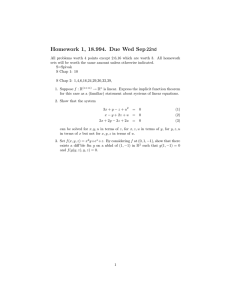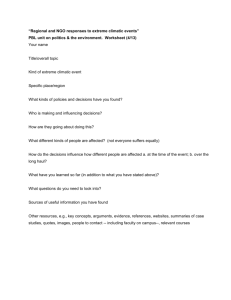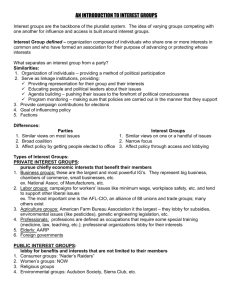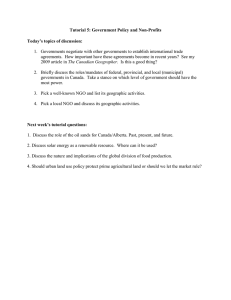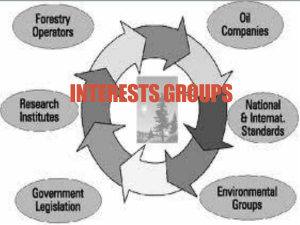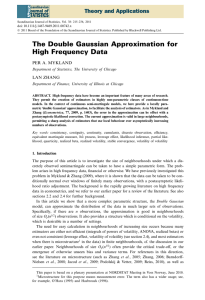Pincer Model
advertisement
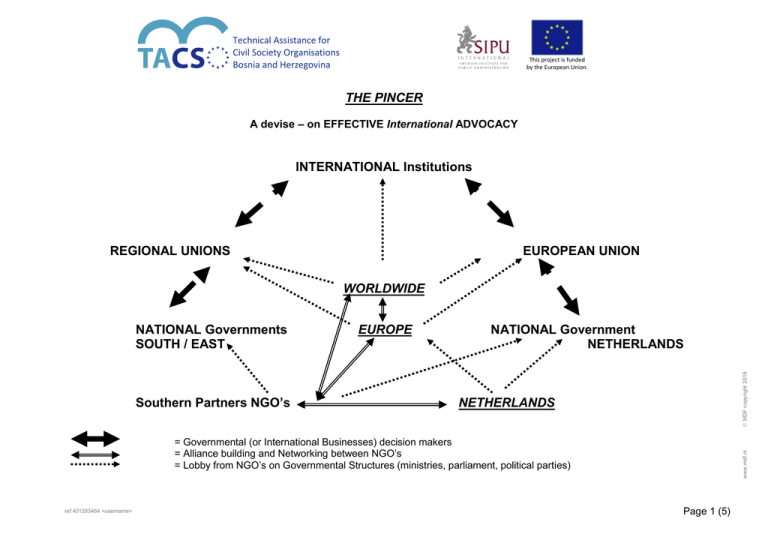
Technical Assistance for Civil Society Organisations Bosnia and Herzegovina Office This project is funded by the European Union. THE PINCER A devise – on EFFECTIVE International ADVOCACY INTERNATIONAL Institutions REGIONAL UNIONS EUROPEAN UNION WORLDWIDE Southern Partners NGO’s EUROPE NATIONAL Government NETHERLANDS MDF copyright 2016 NATIONAL Governments SOUTH / EAST NETHERLANDS ref:401283464 <username> www.mdf.nl = Governmental (or International Businesses) decision makers = Alliance building and Networking between NGO’s = Lobby from NGO’s on Governmental Structures (ministries, parliament, political parties) Page 1 (5) Technical Assistance for Civil Society Organisations Regional Office 1. This project is funded by the European Union. The model of the Pincer (or the Vice) The Pincer is a model of a chain of influence for effective and legitimate advocacy at the international level. Building alliances and networking increase the effectiveness of your advocacy efforts because you are expanding your power basis. Advocacy covers a range – starting with the involvement and mobilisation of Partners in the South / East, of policy influencing by lobbying (political decision makers) ánd communication (with the media and the broader audiences – the public) as explained in the document on the Advocacy Continuum. The arrows show the direction in which policy influencing is taking place and which stakeholders are the targeted audiences by a Coalition in North and South, and working internationally. = Governmental (or International Businesses) decision makers = Alliance building and Networking between NGO’s = Lobby from NGO’s on Governmental Structures (ministries, parliament, and political parties) Lobby on decision makers takes places in finding the responsible and influential persons in: - Governments: ministers and public servants / policy officials; - Politicians in political parties and in parliament - Commercial Sector - Civil Society Organisations - Policy Officers in multilateral institutions The role of a Dutch NGO can contribute to an improved policy influencing of its Southern Partners by offering capacity building on: - Knowledge and analysis of the international field and positions of Dutch and EU negotiators; - Institutional Development of its Southern Partners and networks in developing countries; - Capacity building on negotiating skills and attitudes; - Facilitating direct contact with Dutch and European decision makers; ref:401283464 GR<username> Page 2 (5) www.mdf.nl Internationally policies are decided by representatives of national governments in many negotiation procedures and processes – it is a system with many levels. For Dutch citizens from an EU member state it is also possible to influence the EU – policies directly by influencing the EU – parliament and the officials in the EU governing bodies. Therefore, Southern Partners (SPs) in developing countries will have to influence their OWN NATIONAL governments THEMSELVES. MDF copyright 2016 Formally any democratic influence can be exercised only by citizens and/or organisations in the country where they are residing: at the national level. Technical Assistance for Civil Society Organisations Regional Office - This project is funded by the European Union. Financing lobbying visit of SPs to contact relevant international decision makers; Elaborating and analysing common positions on relevant policy files; In de Communication and Campaigning the Northern / Dutch NGO can develop activities on: - Delivering input to a common website; - Attract media attention at a well-timed moment in supporting the lobbying; - Organising (inter)national campaigns; - Financing national campaigns in developing countries; 2. The example of the Food Trade & Nutrition – Coalition: The policy influencing campaign of the Food Trade & Nutrition Coalition (FTN) followed the logic of this model. Positive experiences could be reported because their was a common political basis from the start due to the involvement of Northern and Southern NGO’s as equal partners in the coalition. Common positions were more easily established and increasingly supported by research on national examples and advanced story telling research. ref:401283464 GR<username> Page 3 (5) www.mdf.nl The FTN started as an initiatve in 2002 during the WSSD (World Summint on Sustainable Develpment) in Johannesburg, South Africa. The different development steps within the model were: - commitment and shared need for joint policy influencing in a few NGO’s (ICCO, India, Brazilië) on food sovereignty, food and nutritional security and trade; - an inventarory in other countries and among interested partners; - the decision to go ahead with the motivated people in these NGO’s; - the preparation of a joint lobby campaign on Food and Nutrition Security, Human Rights and Trade towards the 5th Ministerial Summit of the WTO Cancun in 2003. - 3 strategic workshops in 5 interested countries in which the most important bottle necks were identified, and related to the policies in these countries (trade, agriculture, development and human rights) (Bolivia, Brazil, India, Kenya, Uganda) - Elaboration of a joint background document and a common position statement on a rather broad trade policy agenda. - Lobby conversations with policy officers of the ministries of Economic Affairs, Foreign Affairs, Development Cooperation, Agriculture and some of its ministers. - The organisation of a side event during the WTO ministerial summit with negotiators and representatives from governments of different countries part of the FTN Coalition, including the Netherlands. - The continuous (twice a day) meetings to inform each other on the progress in the negotiations between the NGOs from different countries ánd with other international networks. - A joint statement during and after the WTO summit towards politicians and the media. MDF copyright 2016 This model also requires competent coordination, a strong commitment and trust among its members and alliances. Due to this strong basis is was possible to continuously work on improvement and focus of the policy influencing agenda. An indicator of success is the management of network dynamics. If neglected, the coalition will be suspect to rapid deterioration! Technical Assistance for Civil Society Organisations Regional Office This project is funded by the European Union. In 2003 the approach was strongly focused on the joint de international lobby. The effect was that Southern Countries, both SPs ánd negotiators – were much better informed. It helped stronger countries to create the G20 and the BIC (Brazil, India and China) to increase their power basis. In 2004 plans were elaborated for further consolidation of the FTN agenda: - A joint website - Focusing of policy issues within parts of the WTO – Agreement on Agriculture, and the extension of these same issues to other multilateral and bilateral trade (as a consequence of the external developments in the USA and the EU after the failure of the Cancun Ministerial putting all their effort on bilateral trade agreements). - Further deepening of policy issues through research and positioning: - “stop subsidized dumping of food and food aid”; - “create and stimulate the use of market protection for local markets against dumping”; - “use the precautionary principle on the use of GMOs (Genetically Modified Organisms) to protect poor farmers against multinational dominance”; - Participation in UNCTAD meeting with a side event with national representatives from the FTN member states, including the Netherlands; - Continuation of the policy influencing on ministers in North and South, plus the EU, and its public servants with increased information; - Putting on the international NGO-agenda the issue of “dumping of food aid” through the FAO World Food Programme and the Food Aid Convention; ref:401283464 GR<username> Page 4 (5) www.mdf.nl In 2005 the FTN increased its performance on: - national FTN-strategy plans: which lobby-activities needed to be elaborated towards national government policies, and how could the national power base / legitimacy be improved towards government officials and parliaments. - Case-studies per country were realised, of which the results could be used as examples in the lobby at national and international levels; - The elaboration of a research on nutrition - indicators, as a measurement of impact of trade agreements on food and nutrition security of people suffering from hunger and malnutrition; - 5 strategic workshops – one per country – occurred with a network of local NGOs in order to improve national consolidation of the FTN issues and its lobby; - The sharpening and further focussing of FTN’s joint positions; - Joint lobbying on national governments and international public servants in the EU and the WTO/ WFP/FAC. - Deepening out of the GMOs issue following the EU decision making process on GMO’s. - Strengthening of the collaboration between European NGOs, through Aprodev en Concord/ETN, and international NGO coordination with IATP and IFPRI. MDF copyright 2016 The issue of dumping of food aid was agenda-setting by ICCO/Wemos/Kerkinactie to the FTN-members as an eye-opener, which was supported actively once convinced. Gradually the need developed for consolidation of FTN-position at the national level of FTN-member countries. Alongside the need for more Institutional Development and networking with other NGO’s in these countries increased. They wanted to link their national cases with national policies and link these with the international trade agreements. Technical Assistance for Civil Society Organisations Regional Office 3. This project is funded by the European Union. Management and Alliance Building The FTN casus has been a learning process, in which equal partners learned from each other and added value to the whole. Focus and knowledge deepened throughout the existence of the FTN. External visibility, recognition and attribution increased accordingly. Instrument like media, communication and PR tactics were used to support the policy influencing process: timely and appropriately. Strategies and processes were planned in L&A logframes with a fixed set of activities: Preparotory or internal activities a. Research and analysis of: The issues The policy process in the political arena b. Linking with partners and beneficiaries (the FTN power basis) c. Networking and alliance building (with NGOs outside the FTN) External or exposure activities d. Lobby and policy influencing (policital power basis) e. Communication and media (PR basis) f. Campaigning (critical mass power basis in society in general) The management and coordination of the FTN Coalition was a continuous challenge to its success. Managing the network dynamics was the most important indicator. With a lot of staff changes with Northern NGO’s the process dynamics had to be addressed again and again, when a newcomer arrived. Partly the dynamics were channelled by creating network-mechanisms like: - FTN declaration on Ethics and Code of Conduct; - A Clearing House for positioning and its responsabilities - Creating of sufficient Financiering of a comprehensive FTN-strategy plan with differentiated donors; - Division of roles and responsabilities while lobbying at international policy levels; - Instalment of an independent coördinator (or rotating coördinator) with a clear role and job description; - Establishment of selection procedures on expansion of the FTN with members ín countries and with other countries. www.mdf.nl MDF copyright 2016 The FTN Coalition remained a network and was not institutionalised, despite of the minimum set of standards. It can be seen as a positive example of concerted action and effective advocacy. ref:401283464 GR<username> Page 5 (5)
